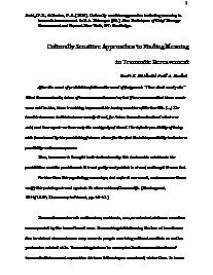Culturally Sensitive Approaches to Finding Meaning in Traumatic Bereavement
Traumatic events such as disasters, accidents, war, or criminal violence are often accompanied by the loss of loved ones. Traumatic grief following the loss of loved ones due to violent circumstances may occur in people surviving cultural conflicts as well as profession related risks. Traumatic grief can be conceptualized as a combination of traumatic distress and separation distress following an unnatural, violent loss. In terms of conditions distinguished in DSM-5 (APA, 2013), traumatic grief reflects a combination of symptoms of posttraumatic stress disorder (PTSD) and persistent complex bereavement disorder (PCBD) (Boelen & Smid, 2017). PCBD is a condition similar to Prolonged Grief Disorder (PGD) entering the forthcoming ICD-11. Mourning behaviors and ways of dealing with bereavement comprise important aspects of an individual’s cultural identity and profoundly affect the way the bereaved survivor finds meaning following traumatic loss. Finding meaning encompasses the bereaved individual’s evaluation of the loss of the loved person and its implications for the future—a cognitive, emotional, and spiritual process aimed at strengthening the individual’s ability to live with the loss within his or her cultural context.
The aim of the current chapter is to describe culturally sensitive approaches to finding meaning following traumatic bereavement. First, we will describe how the therapist explores the context of meaning. This includes exploring cultural ways of dealing with bereavement and grief, and listening to the story of the loss. In the second part of this chapter we will illustrate how different modes of symbolic interactions with the deceased person may aid in finding meaning in a culturally sensitive way. Selected interventions are presented along with case vignettes of refugees as well as a military veteran illustrating their use.
Geachte bezoeker,
De informatie die u nu opvraagt, kan door psychotraumanet niet aan u worden getoond. Dit kan verschillende redenen hebben,
waarvan (bescherming van het) auteursrecht de meeste voorkomende is. Wanneer het mogelijk is om u door te verwijzen naar de bron
van deze informatie, dan ziet u hier onder een link naar die plek.
Als er geen link staat, kunt u contact opnemen met de bibliotheek,
die u verder op weg kan helpen.
Met vriendelijke groet,
Het psychotraumanet-team.
In: R.A. Neimeyer (Ed.) ; New Techniques of Grief Therapy: Bereavement and Beyond | New York: Routledge


